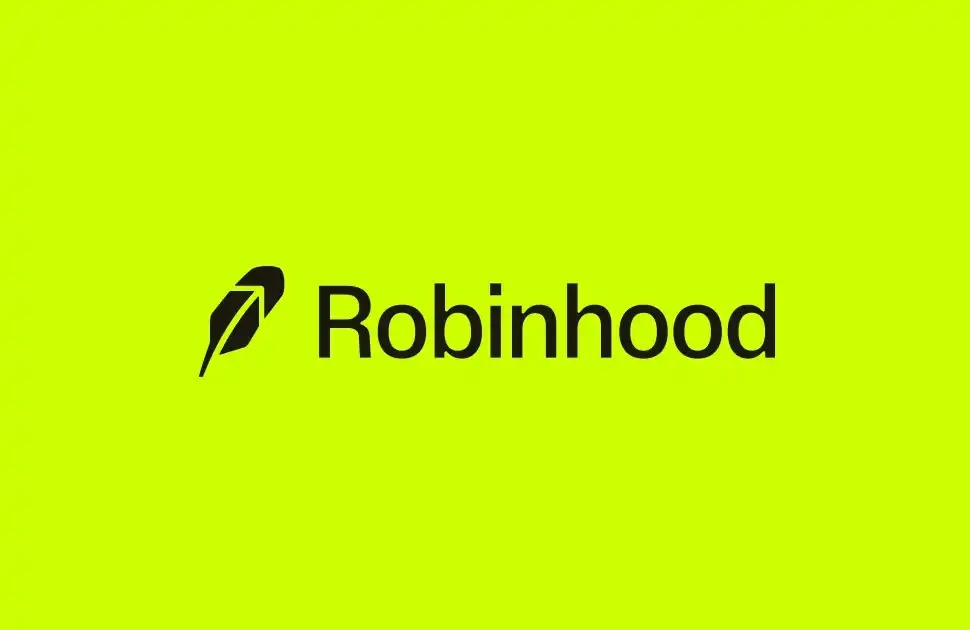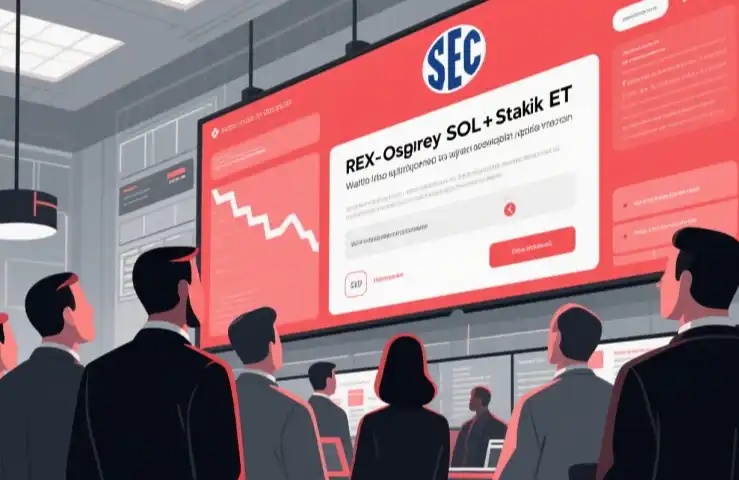SOL ETF Approved, What are Some SOL Thematic Stocks in the US Market?
On June 30, the Solana Spot Staking ETF launched in collaboration with REX-Osprey was approved and is set to officially start trading this Wednesday, July 2. This is the first cryptocurrency ETF in the U.S. market to include on-chain staking rewards. Following the announcement, the SOL price surged nearly 6%, quickly breaking through $160 and currently trading at $154. Previously, several well-known institutions' SOL ETF applications had been pending for a long time, while a little-known company managed to preemptively get the approval.
What sets apart the REX-Osprey ETF that was first to market? In the U.S. stock market, which companies and assets are betting on the Solana ecosystem and becoming investment targets related to SOL?
Underdog Company Takes the Lead: REX-Osprey's SOL Staking ETF Goes Live
Among the numerous ETF issuance applications, the first to make substantial progress unexpectedly was the SOL Staking ETF launched by REX Shares in collaboration with Osprey Funds. In contrast to the Wall Street giants struggling to launch Bitcoin and Ethereum ETFs, these two companies appeared relatively low-key. However, it was this "dark horse" that secured regulatory approval first, introducing the REX-Osprey SOL+Staking ETF as the U.S.'s first staking-reward crypto ETF.
REX Shares is an innovative exchange-traded product (ETP) issuer based in Connecticut, known for launching alternative ETFs such as leveraged, inverse, and options strategies. Osprey Funds, on the other hand, focuses on crypto asset management and has previously introduced products like the Osprey Bitcoin Trust (OBTC). In this partnership, REX Shares led the product design, architecture, regulatory registration, while Osprey Funds provided crypto asset custody, staking execution, and asset management support.
Unlike traditional ETF applicants like VanEck, 21Shares, Bitwise, and others, who are registered investment companies under the 1940 Act and mostly adopt traditional trust or spot ETF structures, simply holding SOL spot without participating in on-chain staking, hence the fund's net asset value depends solely on SOL's price fluctuation with no additional revenue source. Regulatory approvals often focus on whether the staking activities involved extra risks or management challenges, making them difficult to obtain.
According to the issuer, the fund utilizes a C-Corp structure to hold spot SOL and engage in on-chain staking to earn rewards, which are then included in the fund's assets. However, this ETF does not benefit from the "ETF tax-free pass-through" treatment but instead requires corporate-level income tax payments. This structure had previously raised regulatory concerns, but the REX team updated the prospectus and addressed the SEC's issues, ultimately receiving "no further comments" feedback.

The fund mentioned in the SEC prospectus is classified as a "non-diversified" fund
For future investors in REX-Osprey, not only can they easily hold SOL spot positions through the ETF, but the prospectus also indicates that the fund will pledge at least 50% of its held SOL and delegate it to blockchain validators to generate on-chain rewards. Therefore, investors can also receive staking rewards of around 7% annually.
The prospectus also mentions some related risks. The fund is an enhanced return ETF, not a passive index ETF. Therefore, although SOL is the reference asset, the fund will not completely mirror SOL's performance. This is because the fund may also include other SOL-related ETFs, staking reward volatility, transaction fees, lockup periods for staking, liquidity management fees, etc., leading to returns that may not be synchronized with SOL's price. Although structurally for Solana, there might be more "leeching" compared to "inflow," for institutional funds bullish on the Solana ecosystem but lacking compliant tools, this undoubtedly opens a door.

List of US Stocks "Hodling SOL": Who is Playing the Solana Version of MicroStrategy?
With the introduction of the SOL ETF, many investors have started looking at "SOL concept stocks" in the traditional stock market. In fact, several US-listed companies have openly announced this year that they are incorporating Solana into their financial strategies, even considering the SOL token as a core reserve asset on their balance sheets.
DeFi Development Corporation (Ticker: DFDV)
The DeFi Development Corporation can be said to be one of the purest Solana concept plays in the US stock market. This company, formerly known as Janover, once operated a real estate financing platform but made a resolute shift when Joseph Onorati, former Kraken Chief Strategy Officer, took over in April this year. It liquidated its previous business and went all-in on Solana. DFDV has formulated a strategy of accumulating and compounding SOL as its primary financial reserve and swiftly began large-scale SOL purchases. On May 12 this year, the company made a one-time purchase of 172,000 SOL, pushing its total treasury holdings to over 600,000 SOL, worth over $100 million, a position that accounted for about one-third of the company's market cap at the time.
DFDV is not content with just holding passively; it is also actively building Solana infrastructure. In early May, DFDV acquired a Solana validator node business for $3.5 million, integrating itself into the "network core." Subsequently, it collaborated with the popular Solana meme coin Bonk to jointly operate a validator node, increasing the delegated SOL amount and sharing staking rewards. As a result, DFDV became the first publicly traded company to run a Solana node and hold Liquid Staking Derivative (LSD) tokens, achieving a dual appreciation of assets. Since its renaming in early April, DFDV has surged more than 30 times within two months. By mid-May, the stock closed at a historic high of $156.99, representing a staggering 3133% year-to-date gain.
SOL Strategies Inc. (Toronto Stock Exchange: HODL, US OTC: CYFRF)
Another company worth noting is SOL Strategies Inc., headquartered in Canada. The company, formerly known as Cypherpunk Holdings, was primarily focused on blockchain and privacy technology investments (its name is derived from the concept of "HODLing"). In September 2024, after Leah Wald became the new CEO, she boldly reshaped the company into a "Solana ecosystem investment company," renamed it SOL Strategies, and regarded the Solana token SOL as a core asset for accumulation.
According to the company's financial statements, in just half a year, its holdings of SOL have grown from zero to over 239,000 tokens, while gradually reducing its Bitcoin holdings (from 215 tokens to only 3). This shift reflects a complete strategic pivot. SOL Strategies not only buys coins for itself but also manages others' holdings. The company operates multiple high-performance Solana validator nodes, actively attracting third-party SOL delegations for staking. As of March this year, the total staked amount on nodes operated by the company had reached 1.65 million SOL, with approximately 240,000 SOL self-staked and the rest from ecosystem delegations, achieving an average annualized return of around 7%.
To further expand its strategy, the company announced on April 23 a partnership with ATW Partners to establish a convertible bond financing mechanism of up to $500 million, with the funds to be used entirely to purchase SOL for staking. This financing structure is quite innovative: an initial issuance of $20 million in bonds, with subsequent tranches to be drawn based on conditions, with the interest paid directly in SOL staking rewards (investors can receive 85% of the staking rewards). It can be understood as investors providing USD funds, the company buying SOL for staking, and then returning most of the staking rewards in SOL to investors as interest. This design cleverly links bond interest to cryptocurrency asset returns, achieving a win-win situation. It is reported that this move by SOL Strategies is also preparing for a Nasdaq listing—once successfully listed, it is poised to become the first Nasdaq-listed company in North America with a pure Solana ecosystem.
Classover Holdings, Inc. (NASDAQ: KIDZ)
Next up is this year's rising star, Classover Holdings, Inc., a company primarily focused on online children's education that originally had no connection to the crypto world. However, at the beginning of June this year, Classover suddenly announced the establishment of a Solana Treasury Reserve Plan. The company entered into an agreement with Solana Growth Ventures to issue up to $5 billion in senior secured convertible notes to purchase SOL tokens and hold them as a treasury reserve.
According to the June 2 announcement, Classover had already purchased 6,472 SOL tokens (approximately $1.1 million) as a start and plans to allocate 80% of the funding to purchasing SOL tokens. The day after the news release (June 3), Classover's stock price surged, reaching a peak intra-day gain of 46% and closing at $5.45.
Upexi, Inc. (NASDAQ: UPXI)
Upexi, Inc. (NASDAQ: UPXI), a consumer goods brand company, announced in April of this year that it would raise $100 million specifically to establish a Solana financial reserve, with 90% of the funds to be used for coin purchases and staking. Cryptocurrency investment firm GSR led the investment in Upexi's private placement. The market response was similarly explosive, with Upexi's stock price skyrocketing over sixfold in just a few days after the announcement, although it has now fallen back to around $3. Recently, Upexi has made several moves.
On June 26, Upexi announced that it would leverage the Opening Bell platform to tokenize its shares, tokenizing its SEC-registered shares and deploying them on the Solana network. In the past month, Upexi has added approximately 56,000 SOL tokens to its holdings, bringing its total Solana holdings to 735,692 SOL, valued at approximately $105 million at current prices. Following news of an ETF and Robinhood and Kraken launching on-chain "stock" products, Upexi's stock price also surged by 15% today.
Furthermore, some traditional enterprises have begun to embrace a Solana strategy. For example, Australian-listed blockchain investment company DigitalX (ASX: DCC) announced in May that it had increased its Solana holdings to 83,150 SOL and pledged them all, expecting an annualized return of 7-9%, providing the company with approximately AUD $350,000 in additional annual income. DigitalX stated that compared to passively holding Bitcoin, holding Solana allows them to "participate in the rapid growth of the blockchain ecosystem while earning stable income," transforming the company's assets from dormant to yielding.

Solana provides a more "productive" asset option compared to Bitcoin. With significant staking rewards, as calculated by DigitalX, based on the current 7-9% annual staking reward rate, the held SOL will generate hundreds of thousands of dollars in revenue for the company each year. In a compliant framework, SOL as an asset for the company is more like a dividend-paying stock.
Solana Ecosystem Spotlight: DEX and Staking Track Investment Opportunities
Aside from blue-chip companies in the stock market, projects within Solana's own on-chain ecosystem have also become a focus of speculative capital. Particularly, the DEX and Liquidity Staking Derivatives (LSD) tracks saw a surge in interest post-ETF approval.
Raydium (RAY)
One of the oldest decentralized exchanges in the Solana ecosystem. It remains the DEX platform with the deepest on-chain liquidity and widest usage, with over 55% of Solana on-chain trades (routed via the aggregator Jupiter) settling on Raydium. With a deep pool of funds, Raydium is on par with Uniswap among all DEXs across blockchains, sometimes even surpassing the latter in trading volume. Raydium's platform fee is also used for regular token buybacks and burns, having bought back over 10% of the total supply in the past, significantly reducing sell pressure. As Solana's trading activity increases, the RAY token often benefits first.
Following yesterday's ETF news and bullish developments like XSTOCKS, the price surged by 6% in a short period to break past $2.20, currently retracing to around $2.10.

Jupiter (JUP)
The leading on-chain trading aggregator on Solana and a key piece of the network's infrastructure. Jupiter aggregates liquidity from DEXs like Raydium and Orca to provide users with the best trade routes and prices, serving as the preferred entry point for Solana users for swap trades.
Data shows that Jupiter guides 50-60% of the network's volume, and if excluding bot traffic, over 80% of organic trades are completed through its frontend. It could be said that Jupiter's importance to Solana is even higher than 1inch's importance to Ethereum, as in Solana's low-fee environment, aggregated transaction costs are almost negligible, enabling Jupiter to fully leverage its aggregation advantage.
Following yesterday's ETF news and other positive developments such as XSTOCKS, the price surged over 9% in a short period of time, breaking through $0.48 before retracting to around $0.45.

Jito (JITO)
Jito, a newcomer in the Solana ecosystem liquidity staking protocol, is currently a leading project in this space. After Lido's exit from the Solana market, Jito quickly rose to prominence. In September 2023, they launched an airdrop plan, quickly establishing dominance in the space.
Jito's staking derivative tokens (such as Jito-SOL) TVL has reached as high as $17.05 billion, making it the protocol with the largest lock-up volume in the entire Solana ecosystem. Jito's key advantage is the introduction of a MEV (Maximum Extractable Value) boosting staking mechanism, increasing validator rewards. This makes it highly appealing to institutions and large holders. In May of this year, the Nasdaq-listed company DFDV announced the purchase of Jito-produced liquid staked derivatives, setting a precedent for publicly traded companies holding LSD, further validating the value of this space. As JITO token is the native token of the protocol, it may share revenues in the future through staking rewards and other mechanisms. With an increasing number of SOL holders seeking to optimize their capital efficiency, Jito is expected to continue attracting incremental funds, and the JITO token is seen as one of the potential targets in the next phase of the Solana ecosystem.
Clearly learning from DFDV's example, the market naturally drew parallels between Solana's "functional ETF" approval and this protocol. Following the news, JITO also saw a short-term increase of around 14%, briefly breaking $2.49 but then steadily declining to the current price of $2.14.

Overall, amidst the increasing buzz in the Solana ecosystem, infrastructure projects are benefiting the most. Trading protocols directly benefit from the transaction fee growth brought by the trading boom, while staking protocols are seeing a surge in staking demand due to institutional entry. With more traditional capital flowing into SOL through ETFs and publicly traded companies, the value capture opportunities on the Solana chain will grow.
Welcome to join the official BlockBeats community:
Telegram Subscription Group: https://t.me/theblockbeats
Telegram Discussion Group: https://t.me/BlockBeats_App
Official Twitter Account: https://twitter.com/BlockBeatsAsia
 Forum
Forum OPRR
OPRR Finance
Finance
 Specials
Specials
 On-chain Eco
On-chain Eco
 Entry
Entry
 Podcasts
Podcasts
 Activities
Activities









